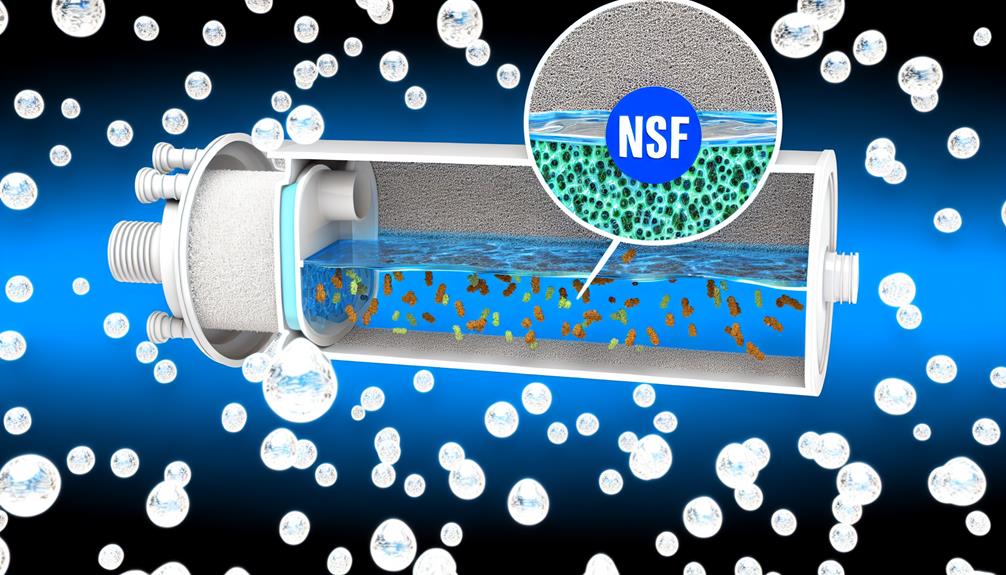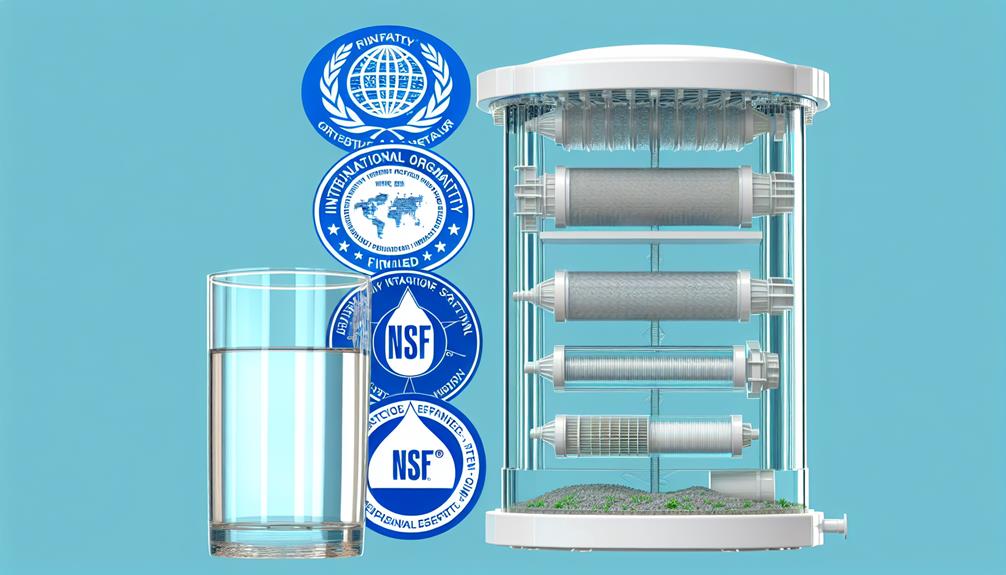Navigating the labyrinth of NSF certification standards can seem like an overwhelming quest, but you hold the key to ensuring the water you drink meets the highest quality standards. As a consumer or industry professional, you're aware that not all water filters are created equal, and the NSF mark represents a beacon of trust and assurance in a sea of products. You've encountered these acronyms—NSF/ANSI 42, 53, 58, among others—but what do they actually mean for you and the safety of your water?
By understanding the significance behind each certification, you can make informed decisions that affect not only the taste but also the healthfulness of your water. Stay with me as we explore how mastering these standards can impact your life, and what lies behind the curtain of NSF's rigorous testing and certification process.
NSF Certification Overview
NSF certification serves as a seal of approval indicating that a water filter has undergone rigorous testing and meets stringent quality, performance, and safety standards. When you select a water filter boasting this mark, you're assured that it aligns with specific Standards for Water Treatment, encompassing a broad spectrum of systems—from aesthetic impurities reduction to the complexities of ultraviolet treatment.
Delving into the technicalities, NSF certifications are pivotal in safeguarding public health, ensuring that your water filter effectively reduces a range of contaminants. This includes microbiological elements and emerging compounds, which could otherwise compromise your drinking water's safety.
The certification process itself is exhaustive. A water filter must pass an extensive product evaluation, followed by meticulous laboratory testing that scrutinizes its performance under various conditions. But the scrutiny doesn't end there. NSF also conducts regular facility inspections to verify consistent adherence to their standards.
Thus, the NSF mark isn't merely symbolic. It's an assurance backed by a robust testing and certification regime. By understanding the analytical rigor behind Water Filter Certification, you can appreciate the level of reliability and trust NSF certification adds to your filtration systems, ensuring they perform as expected in protecting your health.
Essential NSF Standards
Understanding the analytical rigor behind NSF certification equips you with the knowledge to navigate the essential NSF standards that your water filter must meet. Here's a focused rundown of the key NSF standards for water treatment that ensure your NSF-certified water filter lives up to its contaminant reduction claims:
- NSF/ANSI 42: Covers aesthetic impacts, such as chlorine taste and odor. These standards are vital for ensuring your filtration system effectively improves water palatability.
- NSF/ANSI 53: Addresses health-related contaminants. Adherence to this standard is a testament to a filter's capacity to reduce harmful contaminants that could affect your health.
- NSF/ANSI 55: Pertains to ultraviolet treatment systems, with specific classes for different uses. Your UV system's compliance with this standard is critical for microbial safety.
- NSF/ANSI 58: Relates to reverse osmosis systems, aimed at reducing a broad spectrum of contaminants. This standard's stringent requirements reflect the advanced filtration capabilities of RO systems.
Each of these water treatment standards, developed by the respected health and safety organization, forms a cornerstone of the rigorous testing and certification process that ensures your water filter's performance and reliability.
Certification Process Explained
To ensure your water filter adheres to the highest safety and performance standards, the NSF certification process involves rigorous testing and verification of the system's ability to reduce specific contaminants. This meticulous procedure is grounded in a series of predefined Standards, such as NSF/ANSI 42 and 53 for aesthetic and health effects, NSF/ANSI 44 for water softeners, NSF/ANSI 55 for ultraviolet treatment systems, and NSF/ANSI 58 for reverse osmosis systems.
Your filter must undergo a series of NSF testing and certification protocols that assess the efficacy of the adsorption/filtration process, the replacement of hardness ions in water softeners, the inactivation of microbes by ultraviolet light, and the reduction of contaminants through reverse osmosis. Each standard targets a unique aspect of drinking water treatment, ensuring that certified water filters meet exacting product performance claims.
Identifying a filter that has been successfully certified involves looking for the NSF mark—a guarantee that the water filter has been independently tested to reduce contaminants as claimed. You can also utilize resources such as the Contaminant Reduction Claims Guide and the NSF online product database to verify certification and ensure your drinking water system meets these stringent requirements.
Benefits of NSF Compliance
How does NSF compliance benefit both manufacturers and consumers of water filters? It's a crucial question as you delve into the world of drinking water filtration. Here's what you need to know:
- Quality Assurance: NSF certification means that water filters are rigorously tested and certified to reduce specific health effects. This provides an unbiased, independent guarantee that the filters perform according to their claims, ensuring you're getting what you paid for.
- Consumer Confidence: When you see an NSF Certified mark, you can trust that the product adheres to the highest standards for safety and performance. This enhanced consumer trust and confidence can be a significant factor in your decision-making process.
- Continuous Safety: The annual audits required for maintaining NSF compliance ensure that manufacturers consistently meet the water quality standards, contributing to your peace of mind about the safety and benefits of the drinking water filters you use.
- Global Recognition: NSF compliance isn't just about local or national trust; it's recognized worldwide. This means that water filters meeting NSF/ANSI 53 standards are known globally for their commitment to public health and safe drinking water, facilitating international marketing opportunities for manufacturers.
Maintaining Certification Status
Maintaining your water filter's NSF certification requires diligent attention to the latest standards and a proactive approach to quality control processes. As a manufacturer of drinking water filtration products, it's crucial to regularly review and update product documentation and manufacturing methods. This ensures ongoing compliance with the stringent requirements of NSF certification.
Annual facility audits are a non-negotiable aspect of the NSF certification process. These audits serve as a testament to your commitment to quality and safety standards. By scheduling and undergoing these assessments, you not only validate the NSF mark on your filters but also demonstrate due diligence in the certification and testing landscape.
Moreover, staying abreast of any modifications to NSF standards is imperative. Should there be any updates, you must adapt your products to align with the new criteria. This adaptation is essential for your products to remain tested and certified.
In the event of non-conformances or corrective actions highlighted during audits, it's essential to address them promptly. Timely response ensures the maintenance of your NSF certifications.
Lastly, don't hesitate to engage with NSF for guidance or clarifications. A collaborative relationship with NSF aids in navigating the complexities of the Testing Process and fortifies your status as a provider of certified water filtration solutions.

